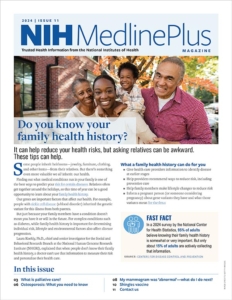Webinar
This webinar was livestreamed on:
Tuesday, October 29, 2024
1:00PM – 2:00PM
Registrants will receive the link to access the webinar after purchase
How to Protect the Health of the Public in an Era of Misinformation.
A Webinar presented by the Friends of the National Library of Medicine.
To be livestreamed on Tuesday, October 29, 2024 from 1.00-2.00 PM EDT
Americans are deluged by a steady barrage of Information about health and medicine. Much of it is useful, but much is untrustworthy, even malicious. How can physicians and other healthcare professionals, as well as the public itself sort through the information noise in order to not be harmed by misinformation and even disinformation?
As a teaching strategy, the Education Committee of the FNLM decided to choose 4 complicated topics, each one of which continues to be a hot, often divisive topic, riddled with misinformation of potential harm to the health of the public.
The 4 topics chosen: vaccines; diabetes and obesity; nutritional supplements; and social media..
We present one keynote expert in each to address a frequent premise. The presentation may be either pro, con, or neutral-balanced. What is accurate and trustworthy? What is misinformation? What is the best way to proceed?
Framing Overview and Program Plan
Welcome and Introduction: A leader of the FNLM
George D. Lundberg, MD, ScD
Framing the issue and providing context
Jeanne Marrazzo MD, MPH, FACP, FIDSA, Director of the National Institute of Allergy and Infectious Diseases at the NIH
Vaccines, There are far too many vaccines and vaccinations that, on balance, do more harm than good.
Peter Marks, MD, PhD; Director – Center for Biologics Evaluation and Research, US FDA
Nutritional Supplements, The current US policy of easy availability of nutritional supplements without FDA approval is seriously harmful to the health of the public.
Tod Cooperman, MD. Founder and President, ConsumerLab.com
Obesity and Diabetes, Now that effective new drugs to prevent and treat obesity are plentiful, the epidemic of Type 2 Diabetes will soon be winding down.
Gary Taubes, Investigative science and health journalist
Social Media: Social media, “writ large”, represents a clear and present danger to the mental health and well-being of underage users.
Dan Romer PhD, Research Director, Annenberg Public Policy Center, University of Pennsylvani
Closing remarks
Andrew Balas, MD, PhD & George D Lundberg, MD. Recap, discuss, summarize and close.
BIOGRAPHIES
View the Biographies using the tabs below.
More information available soon

Andrew Balas MD, PhD
Andrew Balas MD, PhD is a Professor of Public Health at Augusta University, Vice President of the Friends of the NIH National Library of Medicine, member of the American College of Medical Informatics and elected member of the European Academy of Sciences and Arts. His studies about delay and waste in the transfer of research results to health care are frequent reference points in translational research initiatives. The results have been cited by many researchers, policy-makers, and the President of the United States. Currently, he leads the Biomedical Research Innovation Laboratory, a team of researchers conducting ‘science of science’ studies.
 Dan Romer PhD
Dan Romer PhD
Director of Research, The Annenberg Public Policy Center (APPC) at the University of Pennsylvania. Dan Romer (PhD) is a psychologist by background with a career focused on the role of the media as an influence on adolescent mental and behavioral health. He was the founding director of APPC’s Institute for Adolescent Risk Communication and has conducted research funded by the National Institutes of Health as well as other sources to understand the ways in which parents and youth can use media as a tool to support healthy development. As part of this effort, he has focused on how the adolescent brain encourages exploration and risk taking and how this can facilitate learning and development without causing harm. He is an editor of the award-winning Treating and Preventing Adolescent Mental Disorders: What We Know and Don’t Know published by Oxford University Press, which will be coming out in its third edition in 2025.
 Gary Taubes PhD
Gary Taubes PhD
Gary Taubes is an investigative science and health journalist. He is a former staff writer for Discover and correspondent for the journal Science. His writing has also appeared in The New York Times Magazine, The Atlantic, and Esquire, and has been included in numerous Best of anthologies, including The Best of the Best American Science Writing (2010). He has received three Science in Society Journalism Awards from the U.S. National Association of Science Writers. He is the recipient of a Robert Wood Johnson Foundation Investigator Award in Health Policy Research. Taubes is the author of Rethinking Diabetes, The Case for Keto, The Case Against Sugar, Why We Get Fat and Good Calories, Bad Calories (published as The Diet Delusion in the UK).
 George D. Lundberg MD
George D. Lundberg MD
Editor in Chief
A 1995 “pioneer” of the medical Internet, Dr. Lundberg was born in Florida in 1933, grew up in lower Alabama, and holds earned and honorary degrees from North Park College; Baylor University; the University of Alabama (Birmingham and Tuscaloosa); the State University of New York, Syracuse; Thomas Jefferson University; and the Medical College of Ohio.
Dr. Lundberg received his MD in 1957 and has split the ensuing 62 work years across 4 key domains:
- First Quarter: government service; U.S. Army Medical Corps, Vietnam Era, LTC, and Los Angeles County (Laboratory Director).
- Second Quarter: full time academia; USC (Professor of Pathology) and UC Davis (Professor and Chair of Pathology).
- Third Quarter: not-for-profit publishing (Editor in Chief JAMA and VP for all scientific publishing AMA)
- Fourth Quarter: for-profit entrepreneurialism (Medscape, WebMD, MedPage Today, Everyday Health, CollabRx, Self Care Catalysts, PotentiaMetrics, Cureus) and not for profit (Cancer Commons, Harvard, Stanford, Northwestern,The Lundberg Institute).
Dr. Lundberg has worked in tropical medicine and forensic medicine in multiple countries. He is past president of the American Society for Clinical Pathology. A frequent lecturer and webcasting guest and host and a member of the National Academy of Medicine, in 2000, The Industry Standard dubbed Dr. Lundberg “Online Healthcare’s Medicine Man.
 Jeanne Marrazzo MD, MPH, FACP, FIDSA
Jeanne Marrazzo MD, MPH, FACP, FIDSA
Dr. Marrazzo is the Director of the National Institute of Allergy and Infectious Diseases at the U.S. National Institutes of Health (NIH), where she oversees a $6.3 billion budget that supports research to advance understanding, diagnosis, and treatment of infectious, immunologic, and allergic diseases. She was previously the C. Glenn Cobbs Endowed Chair and Director of Infectious Diseases at the University of Alabama at Birmingham Heersink School of Medicine. She is a Fellow of the American College of Physicians and the Infectious Diseases Society of America (IDSA), and was Treasurer of the IDSA from 2021-2023, having served on the board since 2018.
Dr. Marrazzo researches the vaginal microbiome, sexually transmitted infections, and HIV pre-exposure prophylaxis. She has had leadership roles in the NIH HIV Prevention Trials Network and the Infectious Diseases Clinical Research Consortium. She has been a leading voice in communicating science during the COVID-19 pandemic.
 Peter Marks MD, PhD
Peter Marks MD, PhD
Director, Center for Biologics Evaluation and Research, FDA. Peter Marks received his graduate degree in cell and molecular biology and his medical degree at New York University and completed Internal Medicine residency and Hematology/Medical Oncology training at Brigham and Women’s Hospital in Boston. He has worked in academic settings teaching and caring for patients and in industry on drug development and is an author or co-author of over 125 publications. He joined the FDA in 2012 as Deputy Center Director for CBER and became Center Director in 2016, and is a Fellow of the American College of Physicians and a member of the National Academy of Medicine.
 Tod Cooperman MD
Tod Cooperman MD
Dr. Tod Cooperman is a nationally recognized and respected researcher, writer, and speaker on consumer healthcare issues. Dr. Cooperman is a graduate of the Boston University School of Medicine, receiving his M.D. in 1987. He also received his Bachelor’s degree from Boston University with a major in Medical Sciences and a minor in Economics. Recognizing a lack of quality standards and oversight in the U.S. dietary supplement industry, Dr. Cooperman founded ConsumerLab.com in 1999, guiding it to become the leading independent evaluator of dietary supplements and nutritional products. Dr. Cooperman has been called as an expert witness by committees of U.S. House of Representatives and U.S. Senate to give testimony regarding the quality and regulation of dietary supplements and has been regularly invited to speak about dietary supplement quality at the National Institutes of Health. Dr. Cooperman is a member of the Board of Directors of The NVLD Project which is dedicated to helping those with Non-Verbal Learning Disability, a developmental visual-spatial disorder.

